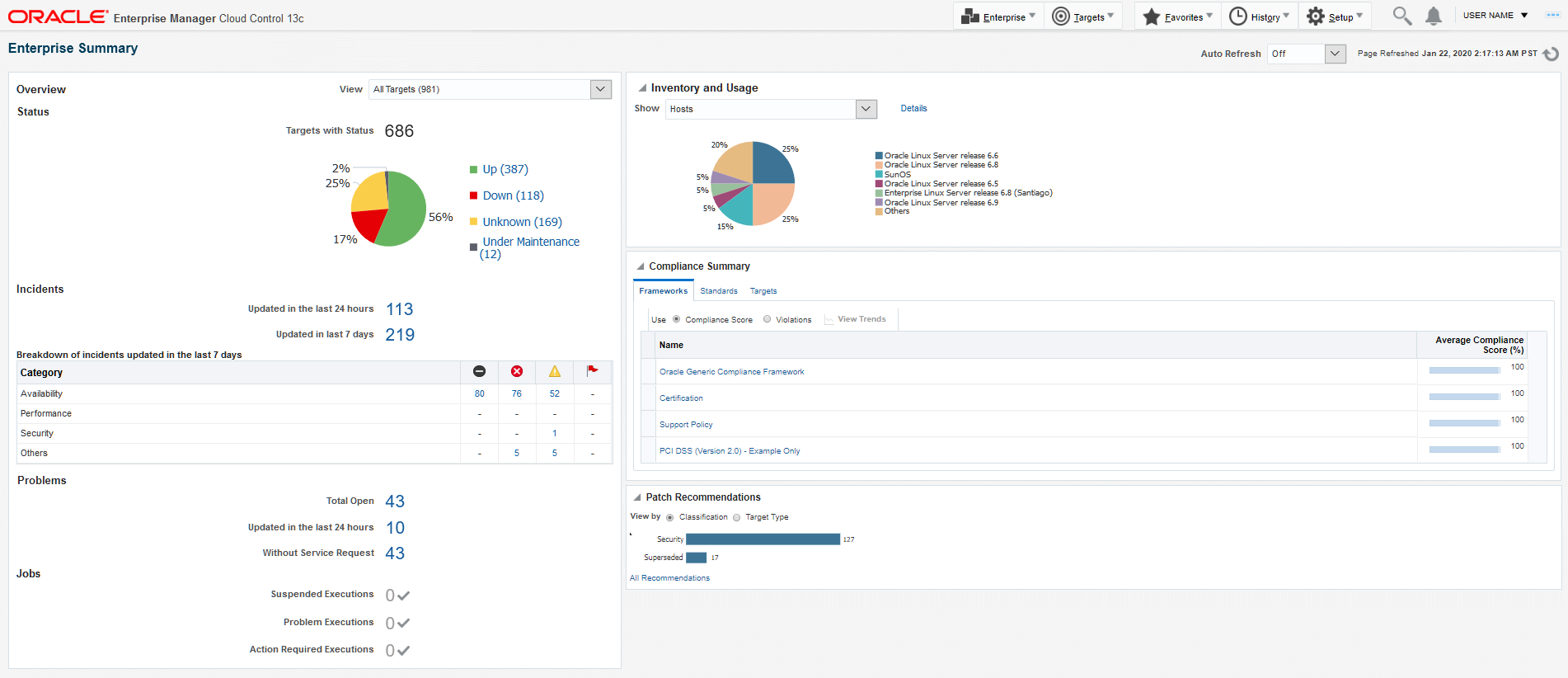About Enterprise Manager Cloud Control 13c
Oracle Enterprise Manager is Oracle's integrated enterprise information technology (IT) management product line, which provides the industry's only complete, integrated, and business-driven enterprise cloud management solution. Oracle Enterprise Manager creates business value for IT by leveraging the built-in management capabilities of the Oracle stack for traditional and cloud environments, enabling customers to achieve unprecedented efficiency gains while dramatically increasing service levels.
The key capabilities of Enterprise Manager include:
-
A complete cloud lifecycle management solution enabling you to quickly set up, manage, and support enterprise clouds and traditional Oracle IT environments from applications to disk.
-
Maximum return on IT management investment through the best solutions for intelligent management of the Oracle stack and engineered systems with real-time integration of Oracle's knowledge base with each customer environment.
-
Best service levels for traditional and cloud applications through business-driven application management.
Figure 1-1 illustrates how Enterprise Manager Cloud Control offers a solution that enables you to monitor and manage the complete Oracle IT infrastructure from a single console.
Figure 1-1 Enterprise Manager Cloud Control Console

For more information, see Enterprise Manager Cloud Control.
Enterprise Manager Terminology
The following table lists the basic Oracle Enterprise Manager terms and concepts.
| Term | Description |
|---|---|
|
Association |
An association is a relationship between two targets. For example, if a host target uses and depends on a web server target, an association should be created between the web server and the host. |
| Dashboard | A dashboard is a data visualization tool that gathers real-time data from the enterprise and displays them in easy-to-interpret widgets. |
| Event |
An event is a significant occurrence on a managed target that typically indicates something has occurred outside normal operating conditions in an environment managed by Enterprise Manager. For example, events are raised when a target is detected to be down or when its performance metrics cross specified thresholds. For more information on events, see Event Management in Oracle Enterprise Manager Cloud Control Monitoring Guide. |
|
Groups |
Groups are an efficient way to organize, manage, and query the targets in your environment. There are two types of groups: static groups and dynamic groups. Static groups contain a fixed list of targets managed by the user and dynamic groups have their list calculated dynamically based upon filters the user provides. |
|
Incident |
An incident is a significant event or set of related significant events that need to be managed because it can potentially impact your business applications. These incidents typically need to be tracked, assigned to appropriate personnel, and resolved as quickly as possible. You perform these incident management operations through Incident Manager. For more information on incidents, see Using Incident Management in Oracle Enterprise Manager Cloud Control Monitoring Guide. |
| Metrics |
Metrics are how you evaluate your targets. Metrics are separated into two main categories: configuration metrics and performance metrics. Configuration metrics represent slowly changing data about a target such as the host operating system version. Performance metrics represent dynamic data about a target which may change rapidly such as the host CPU Utilization (%). |
| Target |
A target represents a monitored resource such as a database, a host, or an application server. Enterprise Manager collects configuration, availability, and performance metrics for each target and defines associations between different targets to represent their relationships. |
| Target Type |
A target type describes the characteristics of the monitored resource. |